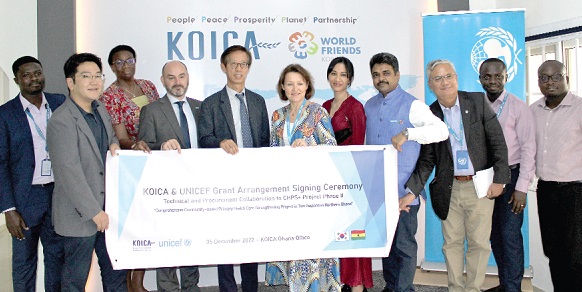
2 Regions to benefit from Korean primary healthcare grant
The Korea International Cooperation Agency (KOICA) and the United Nations Children's Fund (UNICEF) Ghana have signed a $12million grant agreement for the implementation of a holistic primary healthcare delivery project in two regions.
The project dubbed, "Comprehensive Community-Based Primary Health Care Strengthening Project” will be implemented in the Upper East and North East regions.
Advertisement
Also known as the CHPS+ Phase Il Project, the project will be carried out in 15 districts in the Upper East Region and seven districts in the North-East Region in collaboration with the Ghana Health Service (GHS).
MOU
The memorandum was signed in Accra by the UNICEF Country Representative, Anne-Claire Dufay, and the Country Director of KOICA Ghana Office, Moo Heon Kong.
The project, funded by the government of the Republic of Korea, will span over five years from 2022 to 2027.
UNICEF will contribute $3.9million out of the grant.
The Project is a continuation of the Government of Korea's pledge to support the achievement of Universal Health Coverage (UHC) in Ghana.
Ms Dufay said UNICEF would offer its assistance in terms of technical support and procurement through medical and non-medical equipment for various health facilities, capacity building on point of care and quality improvements.
She explained that they would also pilot a low-cost innovative technology to track and manage hypertension and diabetes in partnership with Medtronic Labs.
"Apart from establishing a primary healthcare system, the grant will equally support the ongoing demographic and health survey," she said.
CHPS+ Phase II Project
The CHPS+ Phase II Project aims to improve service delivery at the community level through the capacity building of community health officers (CHO) and community health nurses (CHN).
Mr Kong on the other hand said the project would also focus on enhancing and widening the coverage of the community tricycle ambulance which enabled community members to transport urgent cases such as emergency delivery, from their community to the next point of referral using the emergency transport system.
"The project will enhance community engagement, improve quality of maternal, newborn and child health services and overall strengthening the health system environment," he said.
Outreach services
Mr Kong explained that the day-to-day operation of the CHOs and CHNs would be supported by the provision of motorbikes for effective and efficient outreach services.
“The project will empower the existing community health volunteers to fulfil their role as community health promotional agents through enhanced training, appropriate incentive, and supervision,” he added.
Health service
Touching on health service strengthening, Mr Kong said the project would equip CHPS zones, health centres and district as well as regional hospitals with various medical equipment.
“For the purpose of health system strengthening, the overall supervision and governance in the aspect of leadership and management will also be enhanced through capacity building of personnel in the sub-district, district and regional health management team,” he stated.



